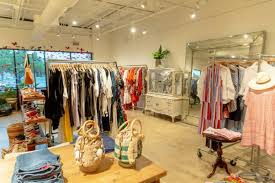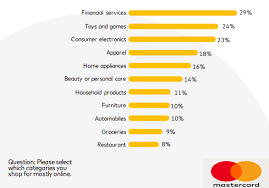Exploring Popular Clothing Stores
In today’s fashion-forward world, there is no shortage of popular clothing stores that cater to a wide range of styles and preferences. From high-end luxury brands to affordable fast-fashion retailers, the options are endless for fashion enthusiasts looking to update their wardrobe.
High-End Luxury Brands
For those with a taste for luxury and sophistication, high-end brands such as Gucci, Louis Vuitton, and Chanel offer exquisite designs crafted from the finest materials. These iconic fashion houses are known for their timeless pieces that exude elegance and prestige.
Fast-Fashion Retailers
If you’re looking to stay on-trend without breaking the bank, fast-fashion retailers like Zara, H&M, and Topshop are popular choices. These stores churn out trendy pieces at affordable prices, allowing fashionistas to experiment with the latest styles without making a major investment.
Vintage and Thrift Stores
For those who prefer unique and one-of-a-kind pieces, vintage and thrift stores offer a treasure trove of hidden gems. From retro finds to designer steals, shopping at these stores is not only budget-friendly but also environmentally sustainable.
Sportswear Brands
With the rise of athleisure wear, sportswear brands like Nike, Adidas, and Lululemon have become go-to destinations for both workout gear and casual everyday wear. Their stylish yet functional designs cater to active individuals seeking comfort and performance.
Online Retailers
In the digital age, online retailers such as ASOS, Boohoo, and Amazon have revolutionised the way we shop for clothes. With vast selections available at the click of a button, these e-commerce giants make it easy to browse through countless brands and styles from the comfort of your own home.
Whether you’re a fashion aficionado or simply looking to refresh your wardrobe, exploring popular clothing stores offers a glimpse into the diverse world of fashion. With options ranging from high-end luxury brands to budget-friendly fast-fashion retailers, there’s something for everyone in the ever-evolving landscape of fashion retail.
Top Benefits of Shopping at Popular Clothing Stores: Style, Savings, and Convenience
- Wide range of styles and trends to choose from
- Convenient locations for easy access to shopping
- Frequent sales and discounts for cost-effective shopping
- Quality assurance with trusted brand names
- Professional staff to provide assistance and fashion advice
- Online platforms for convenient browsing and purchasing
Exploring the Drawbacks of Popular Clothing Stores: Environmental, Ethical, and Consumer Challenges
- 1. Fast fashion may contribute to environmental issues like textile waste and pollution.
- 2. High-end luxury brands can be prohibitively expensive for many consumers.
- 3. Popular clothing stores may promote a culture of overconsumption and disposable fashion.
- 4. Limited size ranges in some stores may exclude customers with diverse body types.
- 5. Quality of materials and craftsmanship in fast-fashion items may be lower compared to higher-end brands.
- 6. In-store crowds and long queues during sales or peak times can lead to a stressful shopping experience.
- 7. Lack of transparency in supply chains and labour practices of some clothing retailers may raise ethical concerns.
Wide range of styles and trends to choose from
Popular clothing stores offer a significant advantage with their wide range of styles and trends to choose from. Whether you’re into classic elegance, bold statement pieces, or casual everyday wear, these stores cater to diverse tastes and preferences. By providing a variety of options, they allow customers to explore different styles, experiment with new trends, and express their individuality through fashion. This abundance of choices ensures that everyone can find something that resonates with their personal style, making shopping at popular clothing stores a delightful experience for fashion enthusiasts of all kinds.
Convenient locations for easy access to shopping
Popular clothing stores often boast convenient locations that offer easy access to shopping for customers. Situated in bustling city centres, shopping malls, or high-traffic areas, these stores make it effortless for fashion enthusiasts to browse and shop for the latest trends without having to travel far. The proximity of these stores to popular hangout spots or transportation hubs enhances the overall shopping experience, allowing shoppers to seamlessly incorporate a visit to their favourite clothing store into their daily routines. This accessibility factor not only saves time but also adds a level of convenience that contributes to the appeal of popular clothing stores among consumers.
Frequent sales and discounts for cost-effective shopping
One significant advantage of popular clothing stores is the frequent sales and discounts they offer, making shopping a more cost-effective experience for customers. These promotions allow shoppers to enjoy savings on their favourite items, making high-quality fashion more accessible to a wider audience. By providing discounts and sales regularly, popular clothing stores not only attract more customers but also create opportunities for individuals to update their wardrobes without straining their budgets. This practice of offering sales and discounts enhances the overall shopping experience and encourages customer loyalty through value-driven initiatives.
Quality assurance with trusted brand names
One significant advantage of popular clothing stores is the assurance of quality that comes with trusted brand names. Established brands have built their reputation on delivering well-crafted, durable, and stylish clothing items that stand the test of time. By shopping at these stores, customers can have confidence in the quality of the products they purchase, knowing that they are investing in pieces from reputable brands known for their attention to detail and superior craftsmanship. This commitment to quality assurance not only ensures customer satisfaction but also fosters trust and loyalty towards the brand, creating a positive shopping experience for fashion enthusiasts seeking reliable and long-lasting clothing options.
Professional staff to provide assistance and fashion advice
One significant advantage of popular clothing stores is the presence of professional staff who are readily available to offer assistance and fashion advice to customers. These knowledgeable and skilled employees can help shoppers navigate through the vast array of clothing options, providing valuable insights on current trends, styling tips, and outfit recommendations. Their expertise enhances the shopping experience, making it more personalised and tailored to individual preferences. By seeking guidance from these professionals, customers can make informed decisions and feel confident in their fashion choices, ultimately elevating their overall shopping experience.
Online platforms for convenient browsing and purchasing
Online platforms offered by popular clothing stores provide a convenient and seamless shopping experience for customers. With just a few clicks, shoppers can browse through a vast array of products, compare prices, read reviews, and make purchases from the comfort of their own homes. These platforms offer 24/7 accessibility, allowing individuals to shop at their convenience without being restricted by store hours or location. Additionally, online shopping provides the flexibility to explore different styles and brands without the need to physically visit multiple stores, making it an efficient and time-saving way to update one’s wardrobe.
1. Fast fashion may contribute to environmental issues like textile waste and pollution.
One significant drawback of popular clothing stores, particularly fast-fashion retailers, is their contribution to environmental issues such as textile waste and pollution. The fast-paced nature of the industry leads to the production of large quantities of garments that are often made from non-biodegradable materials. As trends change rapidly and consumers seek affordable options for quick wardrobe updates, the disposal of unwanted clothing adds to the growing problem of textile waste in landfills. Additionally, the manufacturing processes involved in producing fast fashion items can result in pollution through chemical usage and water contamination. These environmental consequences highlight the need for more sustainable practices within the fashion industry to mitigate its harmful impact on our planet.
2. High-end luxury brands can be prohibitively expensive for many consumers.
One notable con of popular clothing stores, particularly high-end luxury brands, is their prohibitive pricing that often places them out of reach for many consumers. The exquisite craftsmanship and prestige associated with luxury brands come at a premium cost, making their products inaccessible to a significant portion of the population. This exclusivity can create a sense of elitism and perpetuate social disparities in the fashion industry, limiting the ability of individuals from diverse economic backgrounds to partake in luxury fashion experiences.
3. Popular clothing stores may promote a culture of overconsumption and disposable fashion.
Popular clothing stores may inadvertently contribute to a culture of overconsumption and disposable fashion. The constant influx of new trends and collections encourages consumers to purchase more items than they actually need, leading to excessive consumption and a throwaway mentality. This fast-paced cycle of buying and discarding clothes not only strains the environment due to increased waste but also diminishes the value of clothing as a long-term investment. As a result, the emphasis on instant gratification and trend-chasing promoted by popular clothing stores can perpetuate unsustainable shopping habits and detract from the importance of mindful consumption.
4. Limited size ranges in some stores may exclude customers with diverse body types.
One notable drawback of popular clothing stores is the limited size ranges that some establishments offer, which can inadvertently exclude customers with diverse body types. While many stores cater to standard sizing, there is often a lack of options for individuals who fall outside the conventional size spectrum. This limitation can make it challenging for customers with unique body shapes and sizes to find clothing that fits them comfortably and flatters their figure. As a result, the exclusion of diverse body types in terms of sizing can lead to feelings of alienation and dissatisfaction among potential customers who do not fit within the narrow size parameters set by these stores.
5. Quality of materials and craftsmanship in fast-fashion items may be lower compared to higher-end brands.
One notable downside of popular clothing stores, especially fast-fashion retailers, is the compromise on the quality of materials and craftsmanship in their items. While these stores offer trendy and affordable clothing options, the durability and overall quality of the products may not match up to those offered by higher-end brands. Fast-fashion items are often produced quickly and in large quantities, leading to shortcuts in manufacturing processes that can result in lower-quality materials and craftsmanship. This trade-off between affordability and quality raises concerns about the environmental impact of disposable fashion and the long-term value of garments purchased from such stores.
6. In-store crowds and long queues during sales or peak times can lead to a stressful shopping experience.
One notable downside of popular clothing stores is the presence of in-store crowds and long queues, especially during sales events or peak shopping times. The bustling atmosphere and overcrowded spaces can often create a stressful shopping experience for customers. Navigating through throngs of people and waiting in lengthy queues to try on clothes or make a purchase can test one’s patience and detract from the overall enjoyment of the shopping process. The hustle and bustle of crowded stores during peak times may deter some shoppers who seek a more relaxed and efficient shopping environment.
7. Lack of transparency in supply chains and labour practices of some clothing retailers may raise ethical concerns.
The lack of transparency in supply chains and labour practices within some popular clothing stores can raise significant ethical concerns. In an industry driven by fast-paced trends and mass production, the origins of garments and the treatment of workers along the supply chain can often be obscured from consumers. This lack of visibility makes it challenging for shoppers to make informed decisions about the ethical implications of their purchases, potentially contributing to issues such as exploitation, poor working conditions, and environmental harm. As consumers become increasingly aware of these ethical considerations, there is a growing demand for greater transparency and accountability from clothing retailers to ensure that their practices align with responsible and sustainable standards.



